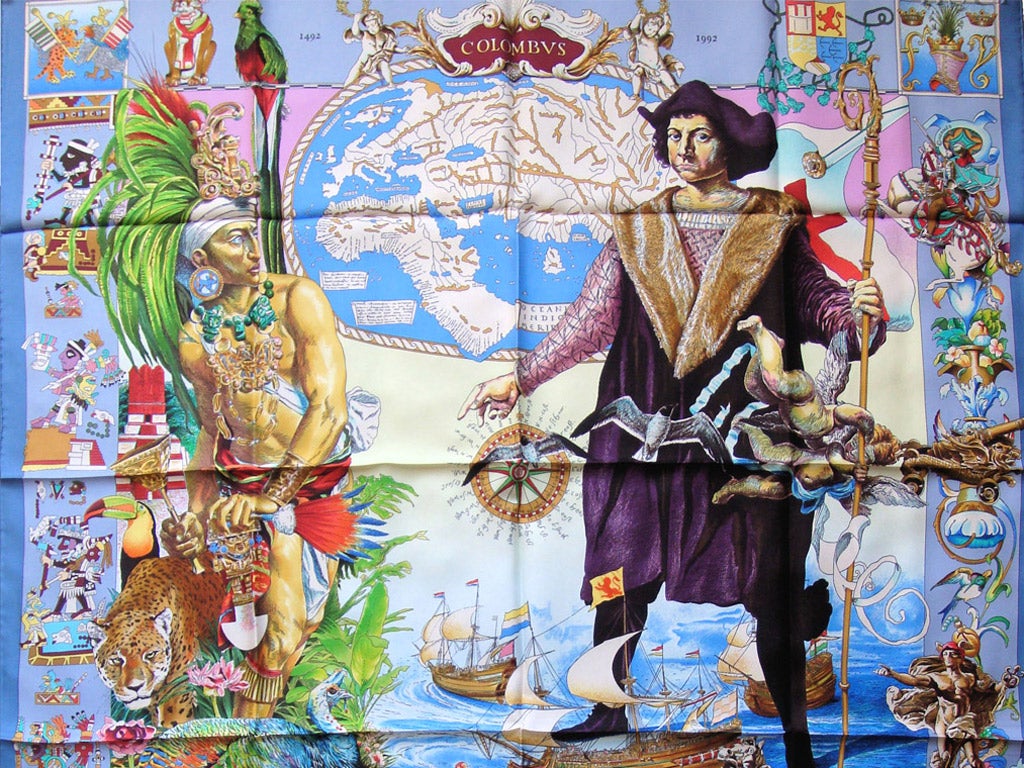The Hermés scarf artist who prefers to work as a mail sorter

Your support helps us to tell the story
From reproductive rights to climate change to Big Tech, The Independent is on the ground when the story is developing. Whether it's investigating the financials of Elon Musk's pro-Trump PAC or producing our latest documentary, 'The A Word', which shines a light on the American women fighting for reproductive rights, we know how important it is to parse out the facts from the messaging.
At such a critical moment in US history, we need reporters on the ground. Your donation allows us to keep sending journalists to speak to both sides of the story.
The Independent is trusted by Americans across the entire political spectrum. And unlike many other quality news outlets, we choose not to lock Americans out of our reporting and analysis with paywalls. We believe quality journalism should be available to everyone, paid for by those who can afford it.
Your support makes all the difference.It's a long way from the Rue du Faubourg Saint-Honoré, just off the Champs Elysée in Paris, to Clifton Street in Waco, Texas, where an elderly postal worker called Kermit Oliver lives with his wife in a modest, prairie-style home.
The former is the global headquarters of Hermés, the expensive French fashion house whose super-chic assistants sell £3,000 handbags, £150 ties and £100 handkerchiefs to the privileged "one per cent".
The latter, scarred by urban decay, is where Oliver, a 70-year-old African-American, has lived with his family since the early 1980s. After returning from night shifts at the local sorting office, he can usually be found in a 10ft-square studio he calls his "monk's quarters".
Kermit Oliver's lifestyle could scarcely be more humble. Yet in the turbocharged realm of high fashion, where they pronounce Hermés "Err-mezz", members of the cognoscenti consider him one of the £15bn French company's most important creative assets.
When he's not sorting mail, the eccentric and somewhat reclusive grandfather toils as a painter. And while he has produced hundreds of paintings and murals over the years and staged several highly successful exhibitions, Kermit Oliver's real claim to fame involves high-end scarves.
In 1984, a Hermés bigwig chanced upon Oliver's oeuvre while on a driving holiday in the US. He promptly commissioned him to design one of the silk carré headscarves which the firm has produced since the 1930s and which have graced the barnets of everyone from Jackie Onassis and Audrey Hepburn to Lady Gaga and Her Majesty The Queen.
That work, a detailed and extraordinarily beautiful illustration of wild turkeys, mountain lions, longhorn cattle and wild mustangs called Faune et Flore du Texas was a huge commercial hit. Oliver was promptly asked to design a second headscarf. Then a third, and a fourth.
Today, Kermit Oliver is the creator of 16 of the most sought-after carrés in the Hermés back-catalogue. Each takes almost a year to complete. Although they retail for roughly £300 – a steep price for what is essentially a square of colourful fabric – his scarves are highly prized by collectors. Secondhand ones fetch £400 on eBay. Vintage examples, unworn and still in the orange cardboard box they were sold in, can go for £1,000.
On paper, that ought to have brought fame and fortune. Hermés carrés are, after all, a commercial goldmine. The firm sells one every 20 seconds and for decades they have been at the centre of its gilded mythology. When Jackie Onassis broke her arm in the 1970s, she used a carré to manufacture a sling. When Sharon Stone enjoyed some light bondage in the 1990s movie Basic Instinct, she used one to tie up her partner.
But the fripperies of celebrity culture mean little to Kermit Oliver, who has always remained below the radar. Despite his long-standing relationship with Hermés, he has always eschewed opportunities to raise his profile.
This week, Oliver explained that career path to Texas Monthly. In his first major interview for seven years, he said that fame simply "doesn't interest me," adding: "Painting is just something I do. I chose not to support my family that way."
Strictly speaking, that's more or less true. Oliver once told a friend: "My needs are very simple. Give me a room with good northern light, my books, my art supplies and a bed and stick some food under the door, and I'm the happiest man in the world."
Join our commenting forum
Join thought-provoking conversations, follow other Independent readers and see their replies
Comments